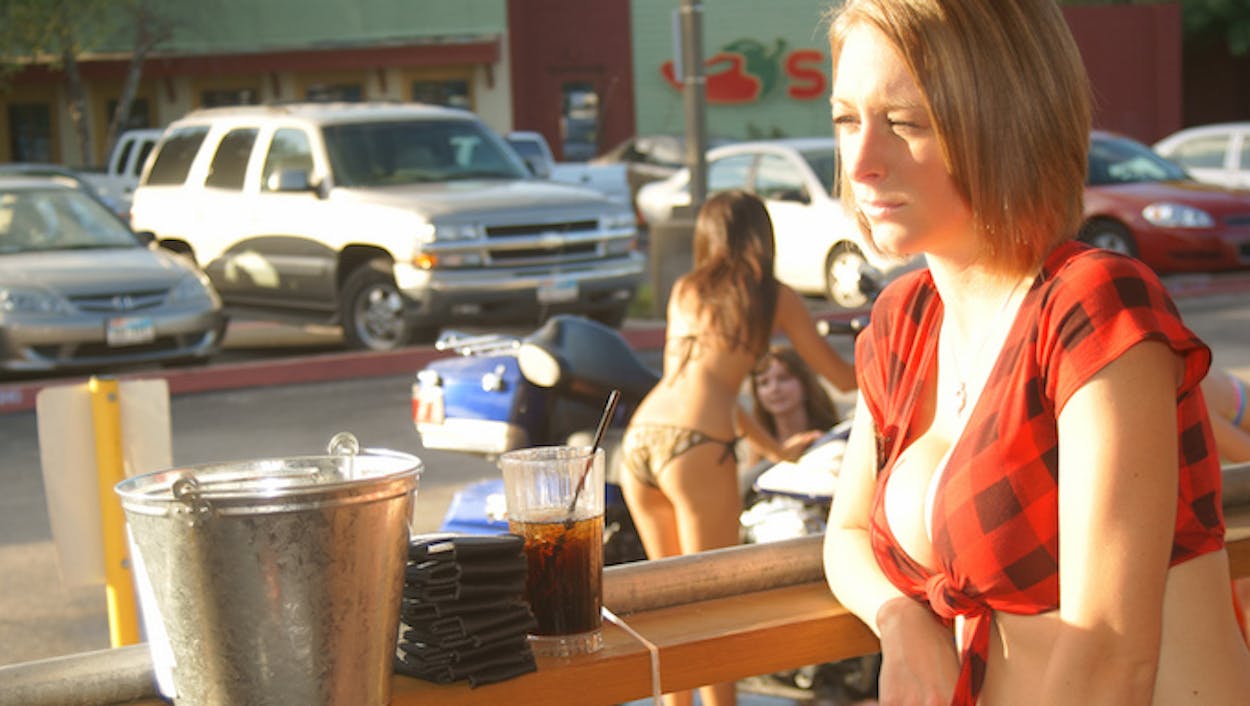The words “Twin Peaks” used to primarily refer to a cult-favorite TV show from David Lynch, but after this week, the breastaurant chain of the same name has finally reached a cultural saturation point. Following the biker fight in the parking lot of its Waco location that left nine dead, eighteen injured, and 170 arrested, “Twin Peaks” now calls to mind something very specific (and only vaguely resembling a David Lynch vision).
It’s not necessarily what the chain would like to be known for, though—the trifecta of boobs, beer, and ballgames is what the company’s brand is based on. As Andrea Valdez wrote for Texas Monthly in 2012, when Twin Peaks’ revenue hit $44 million, the gimmick behind the chain is that “Twin Peaks’ waitresses wear barely-there costumes, a red-and-black plaid crop top and short khaki shorts, in keeping with the chain’s hunter’s lodge theme.”
That means, of course, that sexism is built into the Twin Peaks business model—i.e., only women who are capable of satisfying a particular kind of fantasy are qualified to sling fried pickles at Twin Peaks.
Twin Peaks owner Randy DeWitt makes no bones about the need for the “spectacular talent” for the 22-restaurant chain to succeed. “They have to fit into that costume,” he told [Associated Press reporter Candice] Choi.
But, as a memo obtained by liberal blog ThinkProgress on Tuesday reveals, an implicit “no fat chicks” policy in its hiring practices isn’t the only insulting part of the Twin Peaks business model. In addition to some depressing attitudes toward women, Twin Peaks doesn’t think particularly highly of its male customers, either.
The memo highlights the “brand promise” of Twin Peaks, which is to be the “Ultimate Sports Lodge” that delivers to dudes an experience “that feeds their ego with the attention they crave,” which is probably not the reason most Twin Peaks customers would give for visiting the establishment.
Todd: Yo, Joey, you want to go get some fried pickles?
Joey: Heck yeah, let’s go to Twin Peaks—they feed my ego with the attention I crave!
[They high-five over their mutual insecurities.]
All of that is essentially the unstated premise of the entire breastaurant market, of course—you crave attention from a pretty nineteen-year-old who is paid to pretend that she likes you so much that you will pass by any number of normal restaurants to visit one where the waitresses barely cover their lingerie with buffalo plaid—but the Twin Peaks memo just goes ahead and states it.
The memo goes on to reveal how their conception of the Twin Peaks “raving fan” would introduce himself: “I am the man… I believe in freedom, bacon, working hard and playing harder. I like attention from beautiful girls and being recognized in front of the guys. I got game! I deserve to drink cold beer and catch the game without being asked what I’m thinking. Now get me a beer… pretty please?”
While there is no shortage of guys who think “I believe in freedom, bacon, working hard and playing harder” is a manly manifesto worth putting all over their OKCupid profiles, there’s a desperate, plaintive quality to the raving fan’s self-conception that is decidedly unappealing and, indeed, un-dudely.
It’s possible that Todd and Joey declare “I am the man” and “I got game!” as part of their daily affirmations in front of the mirror, or that they crave attention from the “spectacular talent” at Twin Peaks primarily because they want the other to recognize how cool they each are. In fact, it’s probably even likely—but seeing it articulated like that, in internal communications from the company itself that reveal precisely the neuroses of their ideal customers, sure does take some of the fun out of it, doesn’t it?








